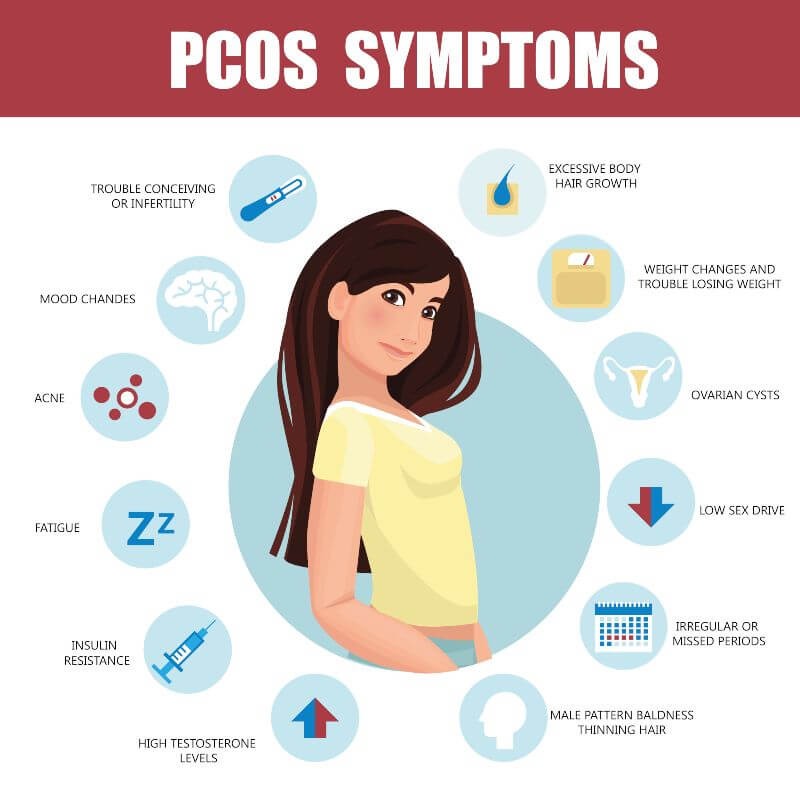Polycystic ovary syndrome (PCOS) is a set of symptoms resulting from a hormonal imbalance due to increased levels of insulin and androgen. It often runs in families which suggests there is a genetic predisposition. PCOS could cause a delay in pregnancy and early treatment and diagnosis together with weight loss could prevent long term complications such as type II diabetes and heart disease.
Polycystic ovary syndrome
PCOS is a pathological syndrome that involves several systems including:
- Reproductive system
- Cardiovascular system
- Metabolism
- Skin and hair.
A PCOS diagnosis is made if you have at least two of the following symptoms
- Irregular periods
- Excess androgen manifesting in excess facial and body hair
- Polycystic ovaries on an ultrasound. Numerous small fluid filled cysts are seen in the ovaries resembling a coiled-up pearl necklace.
PCOS is not a life-threatening diagnosis but can cause a delay in pregnancy.
Polycystic ovaries symptoms

Most cases of PCOS are not associated with any characteristic symptoms, but there are cases where uncharacteristic symptoms appear. Always consult your doctor when you have vague complaints that accompany either irregular periods or excess hair on face and body which are main symptoms of PCOS.
1- Irregular and painful menstrual cycle
One of the most important symptoms of PCOS is an irregular menstrual cycle sometimes accompanied by severe pain alternating between heavy or light bleeding.
2- Pain in the pelvic area
PCOS patients may notice pain in the pelvic area continuously, which might extend to the lower back and thigh area, these symptoms could occur before or after your menses.
3- Difficulty in sexual intercourse
Sometimes polycystic ovary syndrome can cause dyspareunia which is the sensation of discomfort or pain during sexual intercourse.
4- Weight gain
Obesity, weight gain, or even having difficulty losing weight especially in the abdominal and waistline area.
5- Hair loss
some women suffer from hair loss as a result of PCOS due to hormonal imbalance.
6- Problems with bowel movement and urination
This includes pain during defecation and the sensation of continuous urge due to increased pressure on the intestines. There may also be problems in completely emptying the bladder.
7- Hormone imbalance
Another symptom of PCOS is hormone imbalance in very common. Hormone imbalance may cause hair appearance in unwanted places and a change in the size and sensitivity of the breasts.
Polycystic ovaries diagnosis
The diagnosis of polycystic ovaries does not depend on a specific test but rather on a set of symptoms. If the patient has 2 out of the following 3 symptoms she is diagnosed with PCOS
- Irregular menses (Ovulatory dysfunction)
- Access of hair in face, neck, abdomen and body (hyperandrogenism)
- A pearl necklace appearance of the ovaries on ultrasound.
Examinations for PCOS
- Laboratory tests, a hormonal profile in blood to detect hormonal imbalance.
- Pelvic ultrasound to visualize the pearl necklace appearance of the multiple small cysts on the ovaries which is one of the important signs of polycystic ovary syndrome.
Types of PCOS
The way PCOS shows in patients is very variable. Women with the same blood results and ovarian picture on ultrasound can have very different menstrual cycles from one having a totally normal cycle to complete amenorrhea (no menses). The effects on the long run can also be very different.
PCOS Side Effects over time
- Diabetes
- Heart disease
- High blood pressure
Polycystic Ovaries Treatment
There is no medication or surgery that can permanently fix PCOS, but symptoms can be controlled by a variety of lifestyle changes.
1-Lifestyle changes: Eating healthy, exercising, maintaining a healthy Body Mass Index (BMI)
2-Medications for menstrual regulation.
3-If the PCOS makes the ovaries anovulatory or they ovulate very irregular. Ovulation induction can be given if the female seeks fertility.
4-Unwanted hair growth can be treated after consultation with your gynecologist in coordination with a dermatologist. There are several options from hormone regulating pills to laser treatments.
5-Hair loss due to androgenic effects can be treated by hormone regulating pills, vitamin supplements or new Platelet Rich Plasma (PRP) treatments. Ask your gynecologist or dermatologist about the options.
6-Surgery: Through a surgical procedure called laparoscopic ovarian drilling. This procedure is believed to remove some of the cysts in PCOS patients allowing ovulation to occur. This is only advised in certain cases since it can affect the ovarian tissue and negatively effect ovarian reserve.
Prevention of long-term effects of polycystic ovaries
We can’t completely prevent them, but through proper nutrition and weight control, many women with PCOS can avoid the development of diabetes and cardiovascular problems.
Bedaya Hospital has considerable experience in helping women with PCOS. With good patient compliance we can set up a plan to reduce the symptoms of the disease and help them get pregnant when needed. Bedaya’s multidisciplinary team are also developing a protocol for PCOS patients seeking pregnancy.











